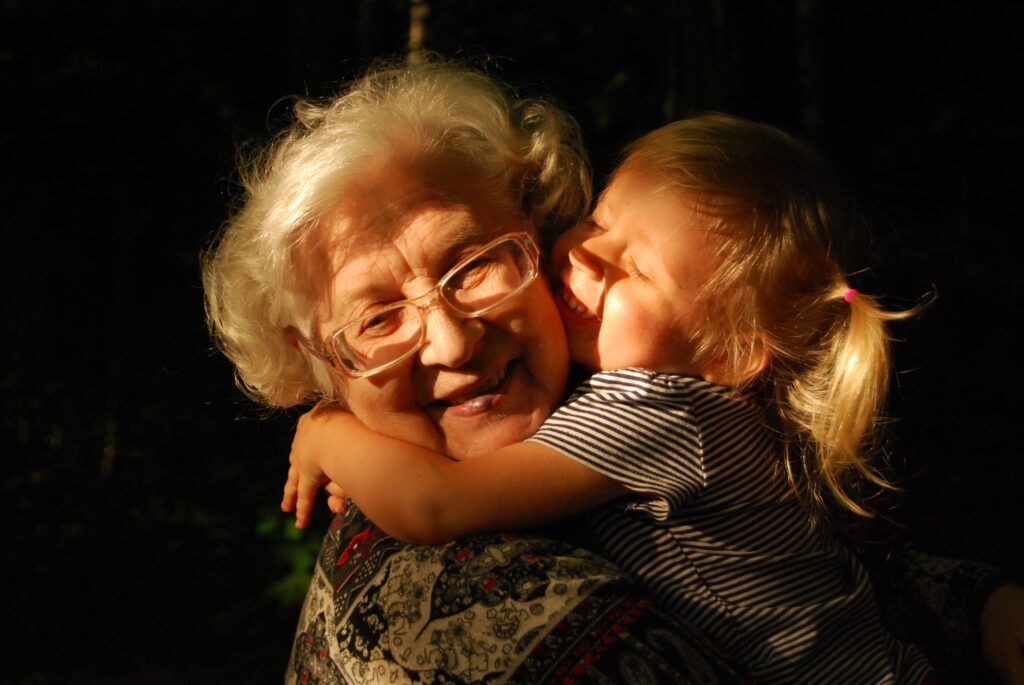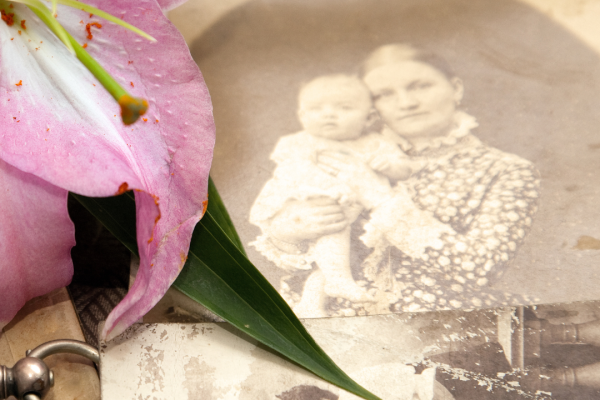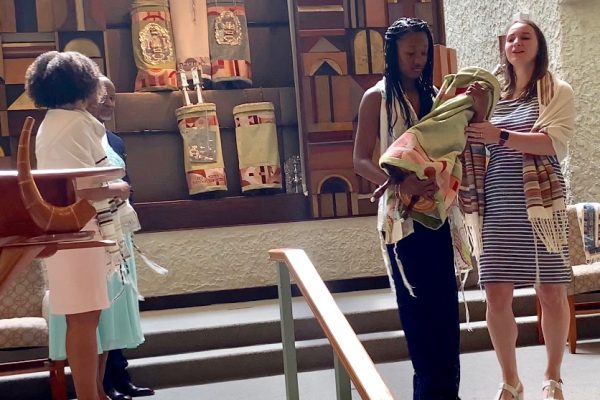Supplies:
- A long, wide ribbon (approximately one yard)
- Table on which people can write on the ribbon, with a paper or book to rest underneath
- 2-3 fabric markers
- Kiddush Cup and wine/grape juice.
- Blessing card with the blessing for kiddush in Hebrew/Transliteration/English
Notes: This ritual can be done for a new baby born to your child or a grandchild joining the family through adoption. Although this is written in the singular, it can be adapted for two or more new grandparents, and although it is written for a first-time grandparent, it could be adapted for any time a new grandchild arrives. This ritual was designed for the new grandparent to celebrate without the child and grandchild, in a situation where there is geographical distance, or in a situation where the child may not be able to be present at the ritual. The bold bracketed text offers an alternative, incorporating the presence of the parent and grandchild.
Opening Chant
Begin with niggun, then add words:
הוֹד֣וּ לַיהֹ כִּי־ט֑וֹב כִּ֖י לְעוֹלָ֣ם חַסְדּֽוֹ
Hodu la’Adonai ki tov, ki le’olam hasdo!
Give thanks to the Source of All Goodness, for God’s love is everlasting! (Psalm 118:1)
Hodu la’Adonai ki tov, ki le’olam hasdo!
Give thanks to the Source of All Goodness, for God’s love is everlasting! (Psalm 118:1)
Beginning
Give thanks to the Source of All Goodness, for God’s love is everlasting!
This morning, we gather in gratitude as we celebrate a transition of generations. Our beloved [grandparent name] has become a grandparent for the first time, when their child [name] has welcomed [grandchild] into the world/into the family.
For as long as we have been telling the stories of our people, we have been telling the stories of our hopes and dreams for future generations. One of God’s first promises to Abraham was that his descendants would be as numerous as the stars in the heavens (Gen. 15:5), and in the thousands of years since, countless people have celebrated being blessed with children and grandchildren.
Today, [grandparent name] has gathered us together [with parent and grandchild] so they can share their gratitude and awe at this transition in generations: at the gift they have received in taking on the new role of grandparent. This morning, we will have a chance to share blessings with them and to hear about their dreams for being a grandparent.
Yes, we will share blessings! In a few minutes I will ask each of you attending today to write down a few words of blessing or wisdom for [grandparent name]. Please begin thinking of what you might like to bless them with today!
Center
The Torah teaches, in the book of Proverbs:
עֲטֶ֣רֶת זְ֭קֵנִים בְּנֵ֣י בָנִ֑ים
Ateret ze’kenim be’nei vanim.
Grandchildren are the crown of their elders. (Proverbs 17:6.)
The classical teaching about this verse is that grandchildren, in their good deeds, honor their parents and grandparents, so their grandparents are “crowned” with the good deeds of their grandchildren (Rashi on Proverbs 17:6). This new child is too tiny to have done many good deeds, and yet we know that simply by arriving in this world and beginning this precious life, [grandchild] has brought so much love and joy into the world. [Grandparent name], may you continue to be honored and crowned by [grandchild]’s deeds for many years to come.
Crowns have rich symbolism in Jewish tradition. The High Priest wore a crown to lead ritual in the ancient Temple, and to this day, many Torah scrolls are adorned with silver crowns. We also say that someone who has studied a lot of Torah has attained the “crown of Torah.” The ancient rabbis teach in Pirkei Avot, our collection of ethical teachings, that among the crown of Torah, the crown worn by the High Priest, and the crown worn by a king, the one crown that supersedes them all is the crown of a good name. A person has a “good name” when they are known to live an ethical life.
[Grandparent name], in the birth/arrival of [grandchild], you have both become an elder and attained the crown of a good name! Although we live in a culture where some might cringe at the word “elder,” in Jewish tradition, elders receive honor and are sources of wisdom. This morning we would like to crown you in your new role as an elder and a grandparent by creating a crown for you.
We will use this ribbon as a crown. I’m going to ask all of you, [grandparent name]’s beloved friends and family, to write on this ribbon a few words of wisdom or blessing for them. We will take a few minutes as you write. We have these fabric markers for you. As you write, I will chant the niggun.
[take 5 minutes or time needed for guests to write blessings]
[Parent(s), this is the time for grandparent to hold grandchild. Please pass the baby to grandparent for this part of the ritual.]
[Grandparent name], before we bless you with this crown, please share with us some of your dreams for your new grandchild and your new role as grandparent.
[If parent(s) and baby are present:
Parent(s), please share with us some of your dreams for seeing your parent as a grandparent to your new child.]
[Grandparent [and parent(s)] share in their own words.]
Now I’m going to read aloud some of the blessings from the ribbon. [read blessings aloud]
As I crown [grandparent] with these blessings, we’re going to take a minute of silence together, so they can receive these blessings.
[Place crown on head and loosely tie it. Minute of silence]
Closing
In moments of joy, we celebrate by raising a cup and blessing it. This kiddush cup is full to the brim, reflecting all of the love and joy that fill [grandparent]’s heart in this moment. They will raise the cup, and as we are able, we will stand with them as they recite the blessing over grape juice:
בָּרוּךְ אַתָּה ה׳ אֱֹלהֵינוּ רוח הָעוֹלָם בּוֹרֵא פְּרִי הַגָּפֶן
Barukh atah HaShem, Eloheinu ruakh ha’olam, borei pe’ri hagafen.
Blessed are You our God, the Spirit of All, Creator of the fruit of the vine.
Chant niggun and sing it again.
הוֹד֣וּ לַיהֹ כִּי־ט֑וֹב כִּ֖י לְעוֹלָ֣ם חַסְדּֽוֹ
Hodu la’Adonai ki tov, ki le’olam hasdo!
Give thanks to the Source of All Goodness, for God’s love is everlasting!












